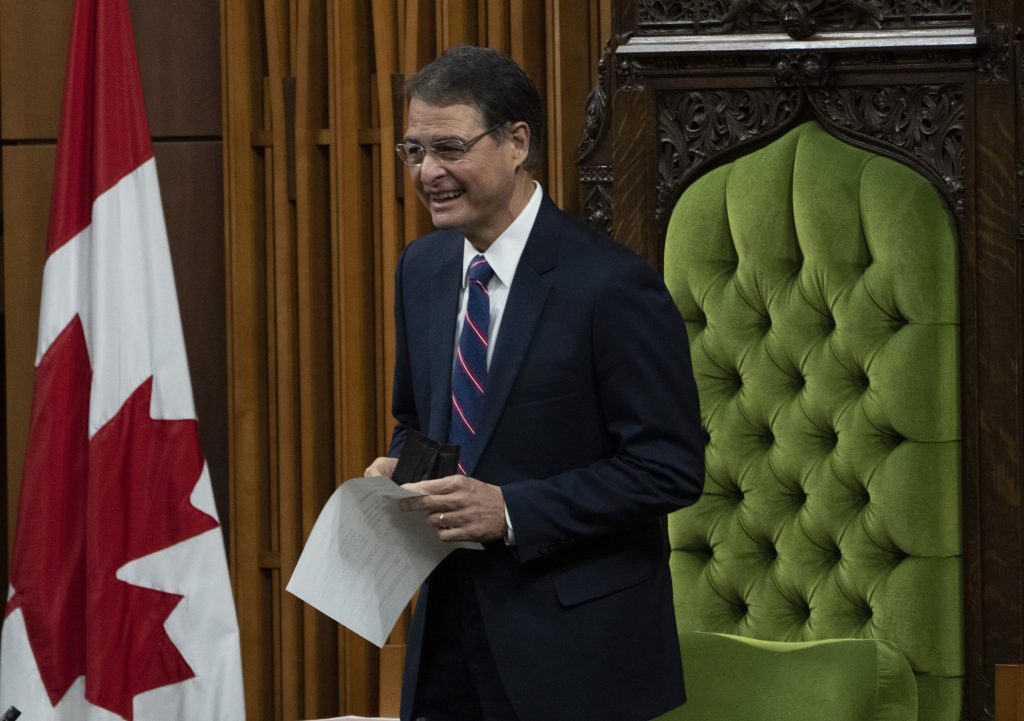Canada News
Order to produce docs on fired scientists ended with dissolution of Parliament: Rota

OTTAWA — The Conservatives have lost their bid to resurrect a House of Commons order demanding the release of secret documents related to the firing of two scientists at Canada’s highest security laboratory.
Commons Speaker Anthony Rota ruled Thursday that the order expired, along with all other business before the House, when Parliament was dissolved in August for a federal election.
Consequently, Rota said it’s up to the House or a Commons committee in the new Parliament to decide whether to issue a new order for production of the documents.
Even then, he said MPs would have to wait and see whether the government complied with a new order before lodging a complaint that their privileges had been breached.
In the meantime, Rota said it is “not possible in the current circumstances to seize the House on these questions of privilege arising from the previous Parliament.”
He was ruling on a question of privilege raised by Conservative House leader Gerard Deltell one day after the new session of Parliament began last month.
Deltell had urged Rota to find that the Liberal government was in contempt of Parliament by going to court last June to prevent release of the documents on the grounds of national security.
Had Rota agreed, the Conservatives intended, with the support of other opposition parties, to pass a motion to issue a warrant to seize the documents from the Public Health Agency of Canada.
The documents opposition parties want to see involve PHAC’s decision to fire scientists Xiangguo Qiu and her husband, Keding Cheng, from their jobs at Winnipeg’s National Microbiology Laboratory last January.
Their demand for unredacted documents includes material related to the transfer, overseen by Qiu, of deadly Ebola and Henipah viruses to China’s Wuhan Institute of Virology in March 2019.
Opposition parties banded together in the previous Parliament to demand just over 500 pages of unredacted PHAC documents, which were to be vetted by the parliamentary law clerk to determine what could be safely released, although MPs would retain the right to publicly release any redacted material they chose.
The battle culminated in June with Iain Stewart, then head of PHAC, being hauled before the bar of the Commons to be reprimanded by Rota over his repeated refusal to comply with the order to produce the unredacted documents. He was the first non-MP to be subjected to such a procedure in more than a century.
The government applied to the Federal Court of Canada a few days later to prevent release of the documents, which it maintained would be injurious to international relations, national defence or national security.
It dropped the case when the election was called in August since dissolution had rendered the matter moot.
Rota’s ruling Thursday does not put an end to the matter.
Deltell said in a written statement that Conservatives “will review next steps in order to get answers for Canadians.”
“The Trudeau Liberals continue to use every tool in their tool box to cover up what happened at the National Microbiology Lab in Winnipeg,” he charged.
The Liberal minority government is seeking a compromise that would allow MPs to view the documents while protecting national security.
Last week, government House leader Mark Holland proposed creating a special all-party, security-cleared committee to review the documents. A panel of three former senior judges would determine what could be made public without jeopardizing national security, including authorizing partial redactions or writing summaries of some documents.
Holland’s proposal is identical to the process that was set up in 2010 by the previous Conservative government to deal with opposition demands to see unredacted documents related to the treatment of detainees handed over to Afghan authorities by the Canadian military.
The Conservatives rejected that proposal Wednesday. Deltell instead suggested that his party might go along with a proposal it previously rejected: allowing national security officials to help advise the parliamentary law clerk on what should be redacted.
A spokesman for Holland said Thursday that the government’s “offer to opposition parties still stands.”
“We have put forward a proposal that provides a reasonable and responsible solution to documents connected to the National Microbiology Lab,” said Mark Kennedy. “We remain ready to work in collaboration with all parties to reach an agreement on this matter.”
NDP Leader Jagmeet Singh said Thursday his party is still assessing Holland’s proposal but he did not sound overly supportive.
Singh said the demand for PHAC documents is “very different” than the demand for documents on Afghan detainees, which could have endangered Canadian troops fighting in Afghanistan at that time.
“We’re not in that same circumstance so (taking) that same approach (on PHAC documents), on the face of it, doesn’t seem to make sense,” he said.
This report by The Canadian Press was first published Dec. 9, 2021.
Joan Bryden, The Canadian Press





















